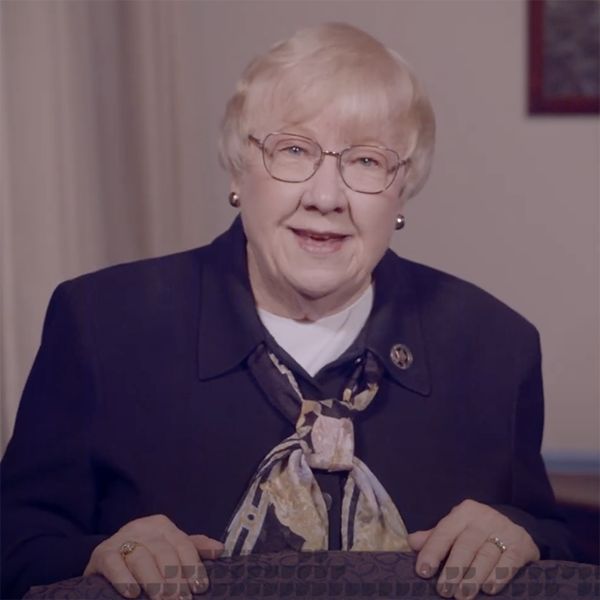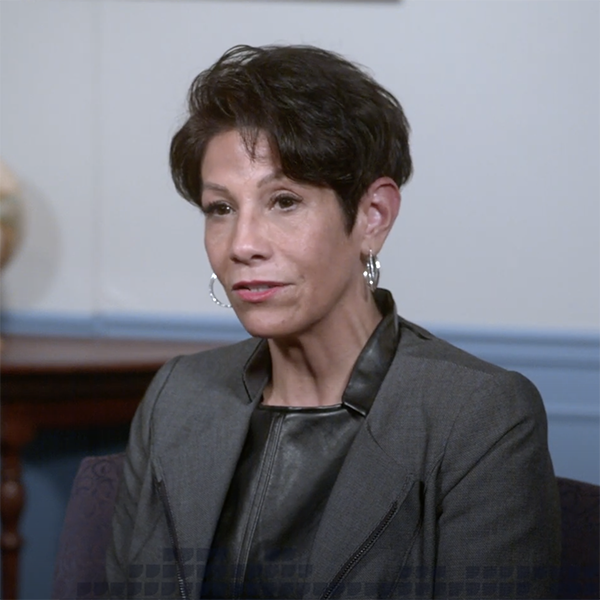What is Financial Exploitation?
Financial exploitation is the misuse or theft of assets, and it can happen to anyone. It can come in the form of unauthorized bank withdrawals, check fraud, misuse of credit cards, scams and theft of property. It is currently the fastest-growing form of elder abuse.
 Educational Video Series
Educational Video Series
What can you do to protect yourself or a loved one from financial exploitation? In these short videos, experts talk about the issues, warning signs and resources available to Pennsylvanians.
Resources related to Alzheimer's and other dementias, with Alzheimer's Association Greater PA Chapter Executive Director Clayton Jacobs:


AARP's lead volunteer on consumer protection and fraud, Mary Bach, provides information to help older adults protect themselves from scammers:


Pennsylvania's Long-Term Care Ombudsman Program works to resolve complaints and issues on behalf of individuals residing in long-term care settings, such as nursing homes, assisted living facilities, and personal care homes. Long-Term Care Ombudsman Margaret Barajas provides information on protecting long-term care residents from financial exploitation:
This video project was funded by a grant award totaling $3,839,908 million from the U.S. Department of Health with $ 0.00 (0%) financed from non-federal sources. The contents are those of the author and do not necessarily represent the official views of, nor an endorsement, by ACL/HHS, or the U.S. Government.
Why Focus on Financial Exploitation and the Aging Population?
By the year 2030, 27.5% of all Pennsylvanians will be over age 60. It's critical to raise awareness, educate, and empower older adults to know the signs of financial exploitation, how to prevent it and what to do if theft is suspected.
Older adults are at an increased risk for financial exploitation due to steady incomes, accumulated wealth, and retirement savings associated with adults of their age. Other factors include mental and physical changes that occur during the natural aging process and an increased dependency on others for help with day to day living. Individuals experiencing symptoms of cognitive decline, or are living with Alzheimer’s disease or other dementia are also at an increased risk of financial exploitation.
Types of Financial Exploitation
There are dozens of types of financial exploitation. Here are some common examples:
- Property theft
- Misuse of income or assets
- Forged and stolen checks
- Investment fraud
- Contractor scams
- Grandparent/grandchild imposter emergency scams
- Medical scams
- Fraudulent IRS calls
- Fraudulent Medicare calls
- Computer and other tech support scams
- Phony solicitation from charities
- Lotteries and phony contests
- Fraudulent use of Power of Attorney privileges
What Can Older Adults Do?
Every older adult, in fact anyone who interacts with older adults has a role to play in preventing, detecting and reporting financial exploitation – from caregivers and healthcare workers to merchants, financial institutions and law enforcement.
- Older adults can take steps to prevent, detect, and report financial exploitation.
-
Help with finances should come only from a trusted source.
-
Never provide personal information, including your Social Security number, account numbers or other financial information to anyone over the phone unless you initiated the call.
-
Secure your checkbook and other sensitive documents in a locked location.
-
Do not sign any document you do not understand.
-
Order a copy of your credit report. You are entitled to a free copy of your credit report from each of the three major credit bureaus once every twelve months. To order your free annual reports, go to AnnualCreditReport.com or call toll- free
1-877-322-8228. Be sure accounts have not been opened in your name, without your knowledge.
If you have any reason to suspect financial abuse, report it!
Accordion
Expand AllClick here for a more accessible versionLearn more about...
Signs an older adult may be at risk of financial exploitation
- Impulsivity to spend money, risky financial decisions, careless financial management, and erratic spending. These tendencies may occur due to the physiological changes associated with natural aging.
- Financial mismanagement and poor investment decisions are often the earliest indicators of declining capacity.
- Large, unusual or uncharacterisic bank account withdrawals.
- Common signs that they may be falling prey to a scam, such as frequent calls from telemarketers, shoddy home improvement work, numerous product purchases or ongoing charitable or religious donations. The loss of what may seem a minimal amount of money to someone with an average income may result in an elderly person having to go without food, medication or possibly their home.
- Unusual or concealed daily activities and contacts.
Help for Caregivers
- Consumer Financial Protection Bureau - provides guides for financial caregivers: Power of Attorney, Court-appointed guardians, Trustees, Government fiduciaries.
- Center for Advocacy for the Rights & Interests of the Elderly (CARIE) promotes the well-being, rights and autonomy of older adults through advocacy, education and action. CARIE provides financial exploitation resources covering elder abuse, Medicare and Medicaid fraud and abuse, as well as caregiver resources.
- The Association for Frontotemporal Degeneration (AFTD) offers legal and financial planning resources for older adults following an FTD Diagnosis.
- The National Center on Elder Abuse (NCEA) provides the latest information regarding research, training, best practices, news and resources on elder abuse, neglect and exploitation. Publications on financial abuse and exploitation, including grandparent and medicare scams, are available in multiple languages on the NCEA website.
- Alzheimer’s Association: After a diagnosis of Alzheimer’s or other dementia, financial planning often gets pushed aside because of the stress and fear this topic evokes. However, you can reduce stress by planning ahead. Managing Money: A Caregiver’s Guide to Finances is a free online program by the Alzheimer’s Association that will help you learn about the costs of caregiving and the benefits of early planning, and teach you how to avoid financial abuse and fraud, start a conversation about finances, assess financial and legal needs, and find support.
- The U.S. Department of Justice Federal Bureau of Investigation Internet Crime Complaint Center offers a brochure on elder fraud. Information addresses common schemes, how to protect yourself and how to file a report if you or someone you know may have experienced fraud. File a complaint at www.ic3.gov. Visit the FBI Elder Fraud website at www.fbi.gov/elderfraud for more information.
- 15 Questions and Answers about Elder Abuse (PDF) – National Center on Elder Abuse, Washington DC
- The Checklist: Signs of Abuse, Neglect, and Exploitation (PDF) – A resource from the National Center on Law & Elder Rights
Alzheimer's and other dementias cause memory, thinking, and behavior changes that interfere with daily living. Learn about common warning signs of Alzheimer's and what symptoms to look for in yourself and others, as well as tips to approach someone who is experiencing changes in their memory, the benefit of early detection and diagnosis, and more by visiting www.alz.org.
- SeniorLAW Center is proud to be the leaders in the fight against elder abuse, a national and local crisis. Access information on elder abuse and victim resources at www.seniorlawcenters.org.
- PA Supreme Court Elder Justice in the Courts Town Hall: Preventing and Responding to Financial Exploitation.
- Contact your County Elder Abuse Task Force.
- Contact your local Area Agency on Aging.
- PA Commission on Crime and Delinquency, Office of Victims Services help crime victims transcend their trauma by funding victim service agencies that work directly with victims, provide financial help to victims through the Victims Compensation Assistance Program (VCAP), and collaborating with criminal justice and allied professionals that advocate and respond to the needs of victims.
- PA Department of State, to file complaints for licensed professionals within PA, including charities, chiropractors, podiatry, dental, medical, nurses, optometry, osteopathic medicine, pharmacies, veterinarians, nursing homes, psychology, physical therapy, speech therapy, social workers, massage therapists, architects, barbers, cosmetologists, engineers, funeral homes, accountants, real estate agents, vehicle dealerships, landscape engineers, auctioneers, and notaries.
Help for Professionals when Financial Exploitation is Suspected
Remember that financial exploitation can occur from someone you know or someone you don't know. If you suspect that you or a loved one have experienced a scam, fraud or financial exploitation of any kind you may notify any of the following to file a report.
- Call the Statewide Abuse Reporting Helpline at 1-800-490-8505.
- File a police report: Contact your local police department directly or visit: www.psp.pa.gov to find your state police barracks.
- File a report with the PA Attorney General's Office:
www.attorneygeneral.gov or
1-800-441-2555.
- File a report with the Federal Trade Commission:
www.ftc.gov/idtheft or
1-877-438-4338.